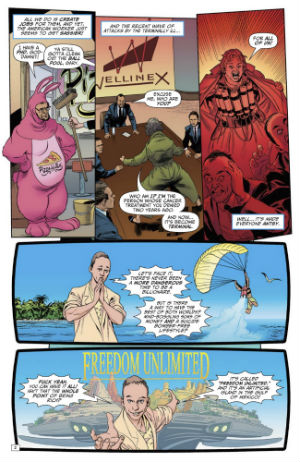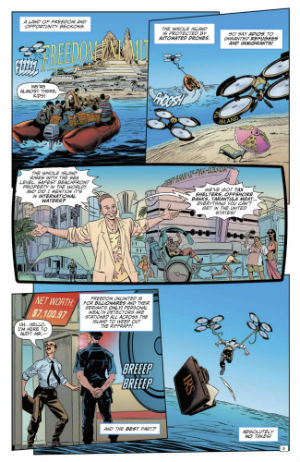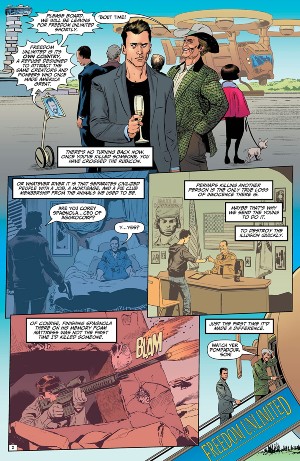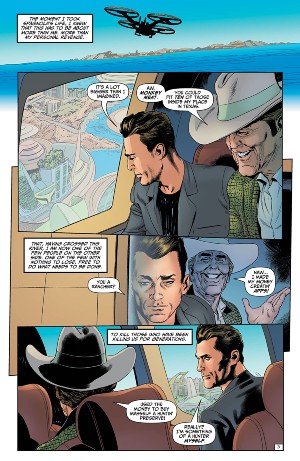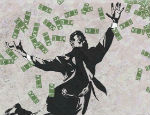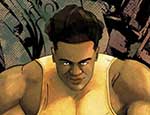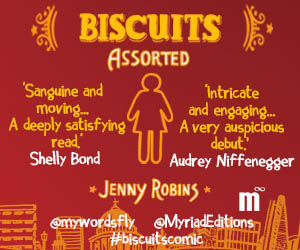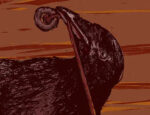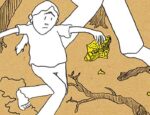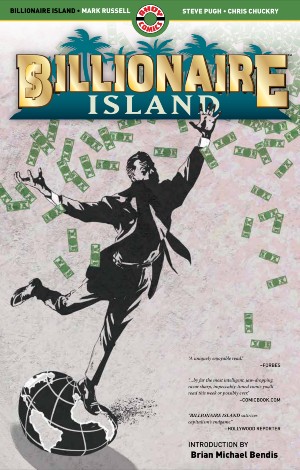 How big is a billion? Don’t be fooled by the banal numerical stats that it’s simply “1000 million”, for beneath those small ovular zeroes lies an exponential explosion of wealth. Such inconceivable worth buys billionaires whatever they want, material and immaterial, launching them into an entirely separate sphere of existence. Such absurd wealth is given appropriate depiction in Billionaire Island, a scorching Swiftian satire of a not-too-distant future.
How big is a billion? Don’t be fooled by the banal numerical stats that it’s simply “1000 million”, for beneath those small ovular zeroes lies an exponential explosion of wealth. Such inconceivable worth buys billionaires whatever they want, material and immaterial, launching them into an entirely separate sphere of existence. Such absurd wealth is given appropriate depiction in Billionaire Island, a scorching Swiftian satire of a not-too-distant future.
Set in 2044, Earth is being ravaged by overpopulation, famine, and uncontrolled climate change. But capitalism remains unchecked. To wait out the apocalypse, the world’s wealthiest retreat to “Freedom Unlimited,” an artificial island that floats along the rising sea-levels of international water. It’s also equipped with automated security drones that remove any residents with subpar net-worth. The gulf between the rich and the rest of the world has never been bigger. Is there a way to have wealth without consequences, to horde resources without being made to distribute them back out? “Fuck yeah, you can have it all!”, billionaire Rick Canto says on an advert for Freedom Unlimited, “isn’t that the whole point of being rich?”
Billionaire Island maintains this outrageous manic humour through its 6-issue volume, alongside following reporters and mercenaries determined to expose Freedom Unlimited and its nefarious practises, before being locked inside a giant-sized hamster cage. Billionaire Island frequently takes this ridiculous wealth to irreverent extremes, populating the Island with literally gold-plated food or “Church of Jesus Christ: Businessman.” Beyond the silly shock-value, Billionaire Island contains clever commentary on the absurdist way our society is run. This includes a spectacular reveal – which I won’t spoil – of who exactly “leads” Freedom Unlimited, and the “invisible hand” behind the stock-market economy.
This nonstop mockery is given extra kick by Steve Pugh’s animated art-style. Pugh leans into caricature, but brings enough distinction and “realism” that the characters remain memorable. He is assisted by Chris Chuckry on colours, who provides bright bombast to the sillier sequences of Billionaire Island, which is then contrasted with the analogue downturns. Pugh’s characters often have wide expressions, being caught in the middle of some movement, imbuing Billionaire Island being like a wacky rollercoaster. Until the momentum slows down to see the frustrated tragedy underneath the comedy.
Mark Russell clearly takes aim at the super-rich (they can take it), but Billionaire Island isn’t only interested in easy targets. Instead, as it approaches the conclusion, a sense of disillusioned melancholy seeps in, ruminating how things could get so absurd, and why society keeps letting it happen. Some prisoners in that hamster cage don’t try to escape, reasoning its merely a test to prove their loyalty; asking “why would they be paying us if they weren’t going to let us out?”. It is called Freedom Unlimited instead of Billionaire Island so average people can imagine themselves going there eventually. The truth is that we toil under billionaires because, deep down, we want to be them too. It’s this touch of weariness, this scepticism at the innate greed of humanity, that elevates Billionaire Island from amusing novelty to fully successful satire. It argues that to truly save the world we cannot simply climb aboard the billionaire lifeboat. We have to let it sink.
Mark Russell (W), Steve Pugh (A), Chris Chuckry (C), Rob Steen (L) • Ahoy Comics, $16.99
Review by Bruno Savill de Jong





